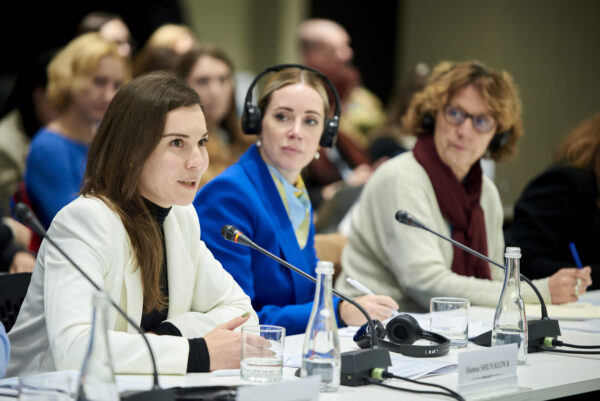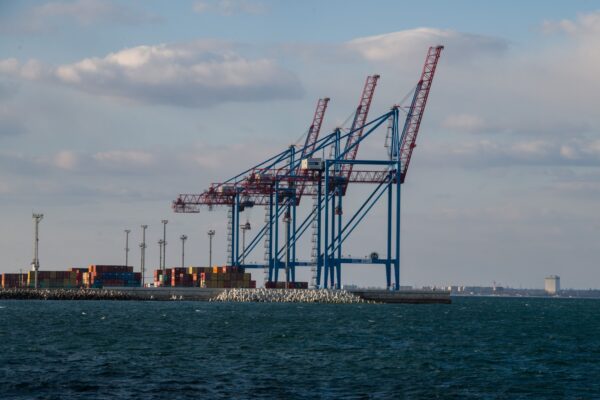Investing in Ukraine: ‘Europe’s last great opportunity’

Kyiv’s investment funds, law firms and high-tech start-ups are preparing for international reconstruction of Ukraine, but this depends on an end to Russian aggression and more progress with domestic reforms.
Between sips of herbal tea at her favourite cafe, close to Kyiv’s Golden Gate – site of the grand entrance to the walled city in the 11th century – Hanna Shuvalova reels off the names and histories of the firms she invests in, as part of her role as principal of Horizon Capital, Ukraine’s premier private equity house.
First on the list is Preply, an online marketplace bringing together students who want to learn a foreign language with appropriate tutors, initiated by three Ukrainian founders in 2014.
“For several years we observed how their approach evolved and their platform grew, entering new markets,” summarises Ms Shuvalova. “The moment has now come for us to support them in their aims, so we became the lead investor in their $70m fund-raising.”
Next was GoIT, another company in the online educational space, already helping 20,000 students learn programming and digital skills necessary for a career in Ukraine’s thriving tech industry and now expanding into neighbouring Poland and Romania, as well as Latin America.
The name of her chosen venue – ‘Idealist’ – speaks volumes. Growing up in Mariupol, a once-bustling port city now occupied and lying in ruins after a three-month siege by Russian troops – entrepreneurs such as her, with digital DNA, are in big demand in Silicon Valley and Europe’s tech hubs.
But after a stint in California, Ms Shuvalova returned to Kyiv, to work with the country’s start-ups and help rebuild Ukraine’s war-torn economy. “Our plan is for our investments in the technological sphere to create opportunities for the younger generation, so the brain drain does not continue and they remain here in Ukraine, building new tech businesses here,” says Ms Shuvalova. “Our challenge is to reshape the conditions, to motivate entrepreneurs to return.”
Much of her time is spent identifying companies with “ambitious plans and products and initiatives in AI”. At the height of the war in 2022, her latest fund exceeded expectations by raising $298m, receiving the blessing of president Volodymyr Zelenskyy.

As 2024 approaches, she plans several more investments from her “strong pipeline of projects”, focused on IT outsourcing and export-related businesses. The criteria of Horizon’s expanding portfolio are key to Ukraine’s wartime resilience. This involves building Ukrainian-based tech players, with an overseas audience for strong, foreign-currency earnings, which in turn boost the domestic economy, giving Kyiv a prosperous atmosphere, despite the country’s ongoing military struggle, approaching its two-year anniversary in February.
Typically, Horizon will invest between $10m and $30m in a single company, with due diligence and “co-operation” sometimes beginning three to five years before any deal is signed. If the fund manager is looking to invest $10m, for a “significant minority stake” of 20 to 30 per cent, the expectation is that the company is already earning more than $10m a year. “We are focusing on companies that have found their feet in the market, whose business is growing, with less risky circumstances than venture capital,” she says.
Ms Shuvalova tells some hairy tales of employees in her portfolio companies avoiding Russian troops, lurking dangerously close to factories and offices. One cohort filled 160 trucks with manufacturing equipment for transportation from east to west Ukraine. Another, in Russian-occupied territory, hid expensive equipment under their beds as occupying soldiers trashed their offices. Businesses have learned from these episodes, all now better prepared for further military assaults and power blackouts.
Most practitioners share similar war stories. Anna Babych, partner in Kyiv law firm Aequo, points to the forests on the far side of the Dnipro river, clearly visible from her window in the Senator Business Center.
“My grandmother and uncle were just over there, calling me from their cellar, as Russian infantry approached,” she says, recalling the first day of the invasion. “It was a shock for my native city to be attacked, but we didn’t know yet what was going to happen, as this was before Bucha or Mariupol,” says Ms Babych, referring to two notorious sites of later Russian atrocities.
Funds for foreign investors
Like much of the business community, Ms Babych briefly moved overseas, before returning to spearhead her business, now structuring funds for foreign investors seeking to finance the estimated $750bn rebuilding of Ukrainian industry and infrastructure.
As well as working pro-bono for the Superhumans project in the western city of Lviv – a hospital supplying prosthetics for soldiers maimed by Russian attacks, established by Andrey Stavnitser, owner of Ukraine’s largest port in Odesa and backed by donors including Warren Buffet and Richard Branson – most of her work is now helping clients in the investment industry prepare for a post-war rebuilding boom, once hostilities cease.
There are several sectors she is highlighting as investment opportunities. These include logistics and energy infrastructure, including rebuilding the Nova Kakhovka dam on the Dnipro river and investing in renewables and wind farms, particularly suited to the open spaces of Ukraine’s southern steppe-land. But it is the tech-led defence industry which is particularly capturing the imagination of foreign investors, although, part of the supply chain will be outsourced to neighbouring nations for security reasons.
“The government wants localisation and production here in Ukraine,” says Ms Babych. “But everybody is cautious about security. Some temporary solutions might be on the other side of the border, in Poland or Romania, although drone assembly will be on Ukrainian territory. Generally, this should kick-start the whole region.”
Many Ukrainian start-ups, and those from neighbouring Baltic nations, focus on dual-use technology, leveraging peacetime innovations for today’s wartime environment. “They are telling me war is disruptive,” says Ms Babych. “They feel that if you’re working in defence tech and you are not in Ukraine, you do not exist. They see it as a huge opportunity,” she says, expecting to see more military entrepreneurs making investments in Ukraine during 2024.
She is also helping establish a government sponsored fund to oversee assets designated as “vital to national interest and security”, which will potentially outsource asset management to external fund houses.
“Everything depends on our offensive success on the battlefield. There are a lot of businesses just sitting and waiting for material developments on the front line,” says Ms Babych. “We are seeing new faces from the investment world coming to Ukraine and we have a couple of deals we are already working on from private equity funds.”
Back in September, some of these investors were in Kyiv to take the war-ravaged country’s temperature and discuss which sectors to invest in, at the YES forum organised by Victor Pinchuk, a media and metals magnate turned philanthropist.
In a reinforced hotel basement in Kyiv’s historic centre, financiers mingled with politicians including Ukrainian president Volodymyr Zelenskyy, former UK prime minister Boris Johnson, and US acting deputy secretary of state Victoria Nuland.
Among the delegates was Adrian Karatnycky, senior fellow at the Atlantic Council and adviser to family offices looking to invest in rebuilding Ukraine, which he calls “the last great opportunity left in Europe” for global investors, which could be further fuelled by the diversion of frozen Russian assets.
A new “dynamism” will revolve around green energy, infrastructure and high-tech defence projects, believes Mr Karatnycky, an American of Ukrainian origin, expecting the smokestack economy of traditional fossil-fuel-based oligarchs to fall out of favour and into disrepair, with much of it in now in Russian-occupied territories.
“I think Europe and US donors will dictate where the priorities are in energy and they are trying to push Ukraine into a more and more green direction,” he says. “European money will not want to build new, gigantic, coal-fired energy plants.”
Risk management priorities
Western investors are also impressed by improving corporate governance and the government’s tackling of nefarious practices, he believes. “Ukraine no longer qualifies as a home for endemic corruption,” says Mr Karatnycky. “Some of its pockets of corruption have been cleaned up, and more will be cleaned up as soldiers return from the front.”
There is also practical help available for family offices investing in Ukraine, with risk management firms springing up to help investors. “Risk management goes beyond traditional security of armoured trucks and guns,” says Rasmus Aagaard Ulfeldt, a former Danish infantry officer, experienced in war zones in former Yugoslavia and Afghanistan, now head of risk at Bright Bird.
Preferring to focus on “situational awareness”, Mr Ulfeldt believes the situation on the ground in Ukraine still allows investors to travel in for meetings and fact-finding missions.
“Unlike Yugoslavia, where there were many factions and paramilitary organisations, leading to a very asymmetrical situation, Ukraine has a frontline and conventional military, making it easier to plan journeys for investors,” he says.

Bright Bird locates visitors in hotels with robust bomb shelters, away from key infrastructure, while tracking Russian missile trajectories through digital apps, to minimise impact of any debris. The service also involves helping to set up office space, access to medication and health support.
Bright Bird itself benefited from investment “in the low single millions” from Denmark’s Bernhoft family, which has an office in the Ukrainian southern city of Nikolaev and owns the Multi-Wing industrial components group.
“What we are seeing in Ukraine today is totally new,” says Mr Ulfeldt. “You can be sitting in Odesa, sipping a café latte on the seafront, with kids roller-skating past, when people hear an alarm or receive an alert on their phones. Often, they have 10 minutes to decide whether to stay in the café or take shelter. This is a completely new phenomenon.”
Currently, facilities along the Black Sea coast, where grain and port infrastructure have been regularly attacked by Russian forces, are receiving much attention from potential investors.
“Everyone’s a bit hesitant at the moment, as the Black Sea is getting a lot of heat from the Russians,” says Mr Ulfeldt, whose team have accompanied investors to view road, energy and real estate rebuilding projects.
“They can see potential, but are reluctant to commit at this stage, as some of them have already lost money withdrawing from Russia, when they had to get rid of businesses there. Although they are very risk tolerant, they are still a bit afraid of losing their money twice.”
Black Sea navigation
The importance of navigation of the Black Sea to Ukraine’s economic future is also highlighted by Timothy Snyder, history professor at Yale in the US. Mr Snyder is a key figure in the Ukrainian History Global Initiative, a three-year project funded by Mr Pinchuk, bringing together 90 international and Ukrainian historians.
The Black Sea’s position in the global supply chain is “catastrophically underestimated”, believes Mr Snyder, “whether we are in classical times, selling wheat to Athens or exporting to the near East and Africa today”, with Russian blockades leading to global price inflation and agricultural goods shortages.
Russian foreign policy, says Mr Snyder, involves “the break-up essentially of that free trade”, restricting food supplies to Asia and Africa to give Moscow more leverage in its foreign relations. “What the Ukrainians have done in penning back the Black Sea fleet and opening up a lane for commercial trade,” forms a “very significant part of their counter offensive or at least of their war effort, which has not been reported on enough,” he says.
Re-establishment of the critical waterway as a “healthy commercial zone, which it has been for literally millennia” would pave the way for a mass rebuild of maritime infrastructure, says Mr Snyder. “It's fair to say that Ukraine's economy in the future will depend on agriculture, energy and technology and those are the main areas that foreign investors are going to concentrate on.”
Keeping the southern seaport of Odesa under Ukrainian control should be Kyiv’s number one priority, agrees former presidential adviser Vadym Karasyov, now one of the country’s best-known media commentators. “Without the Black Sea we do not have a country, trading hub or functioning economy.”
Political reforms
The only way to defend the country and attract foreign investment, he believes, is changing the structure of the country’s political leadership, with a post-electoral “coalition of patriotic forces” working with the president.
This could be made up of figures trusted by the international community, says Mr Karasyov, suggesting: Oksana Makarova, a former investments and finance minister currently serving as Ukraine’s ambassador in Washington; economist and former prime minister, Arseniy Yatseniuk; and former world heavyweight boxing champion now serving as mayor of Kyiv, Vitali Klitschko. There is also potential for military leaders such as Kyrylo Budanov and Valeriy Zaluzhnyi to be involved in the government’s decision-making, he believes.

“We need an end to concentration of political power at the top of the government, where a handful of people control both domestic and international affairs,” says Mr Karasyov. “Yes, we are holding off the enemy, but the economy is not developing.”
In order to rebuild, he says, Ukraine needs either a negotiated settlement, or a frozen conflict enabling it to build up agricultural and defence capabilities, both areas ripe for investment, backed by government guarantees.
“Technology and start-ups are fired by the enthusiasm of young people, but this alone will not win the war for Ukraine,” says Mr Karasyov. “We need missiles and a defence economy, with our own programme to build these, rather than relying on donations from the US and UK, whose resources will be increasingly restricted.”
Yet there is an undoubted belief among Ukraine’s high-tech start-up community that Ukraine will enjoy a long-term brighter future. Victoria Repa, founder of the BetterMe health coaching app – a business in which Horizon Capital first invested seven years ago – looks at pictures of her house, village and school on the outskirts of Donetsk, all destroyed by Russian forces.
“These pictures really motivate me to work hard, because I want Ukraine to be a big, powerful country in future generations,” says Ms Repa, whose start-up now employs 200 staff in in Ukraine, with annual revenues of close to $800m. “Once we have a big GDP and powerful economy, nobody will invade us because they think we are weak. Weakness first of all comes from lack of economic power. When you have this power and the mindset that goes with it, nobody wants to fight you.”
This article is from the FT Wealth Management hub





